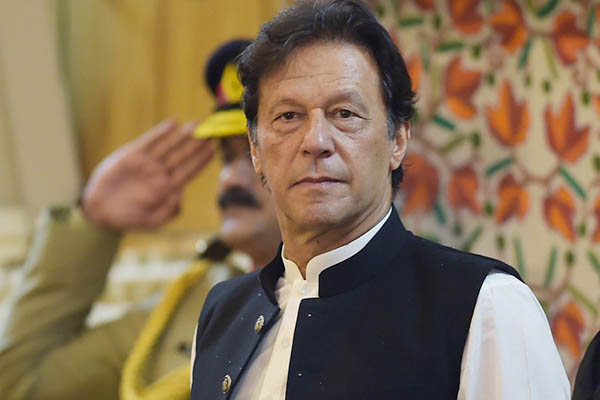
File photo of Prime Minister Imran Khan. Aamir Qureshi—AFP
Addressing U.N. panel, he urges tax havens to return stolen wealth of developing countries, hold ‘enablers’ like lawyers accountable
Prime Minister Imran Khan on Thursday issued a list of 9 recommendations that he claimed would help curb money laundering and corruption, including regulating lawyers and accountants and discarding “unequal” investment treaties.
Addressing the United Nations International Financial Accountability, Transparency and Integrity panel via video-link, Khan called on countries that are seen as “tax havens” to take decisive actions, and return any wealth “looted” from developing countries. “We welcome the interim report of the FACTI panel. The figures […] mentioned in the report are staggering,” he said, claiming that $1 trillion is taken out of developing countries by “white collar criminals” every year. Of this, he said, “$20-40 billion” was in the form of bribes paid out to them.
The prime minister also noted that the report had found $7 trillion in stolen assets was parked in tax haven destinations, and $500-600 billion was lost annually through tax avoidance of multinational companies. “This bleeding of poor and developing countries must stop,” he added.
Khan said 26 people across the world owned as much wealth as half the world’s population, while around one billion people—almost 15 percent of the global population—lives in poverty. He said the need for developing countries to protect and preserve their resources had become even more vital because of the recession triggered by the COVID-19 pandemic. “Unless these steps are taken, the difference between the rich and the poor will keep growing,” he warned, adding that the developing countries would get impoverished and the migration crisis would balloon even further.
Imran Khan’s Recommendations
The prime minister listed nine measures that he claimed would curb corruption and money laundering:
- Stolen assets of developing countries, including proceeds from corruption, bribery and other crimes, must be returned to their origin states.
- Authorities in tax havens must impose criminal and financial penalties on financial institutions that receive and utilize such money and assets.
- Enablers of corruption and bribery, such as accountants and lawyers and intermediaries, must be closely regulated, monitored and held accountable.
- Beneficial ownership of foreign companies must be revealed upon inquiry by any interested and affected governments.
- Multinational corporations must not be allowed to “profit-shift” to low tax jurisdictions. A global, minimum corporate tax could prevent this practice.
- Revenues from digital transactions should be taxed at their point of origin.
- Unequal investment treaties should be discarded or revised, and a fair system for adjudication of investment disputes set up.
- All official and non-official bodies set up to control and monitor illicit financial flaws must include all stakeholders.
- The U.N. should set up a mechanism to coordinate and supervise all the official and unofficial bodies dealing with illicit financial flaws to ensure coherence, consistency and equity in their work.
